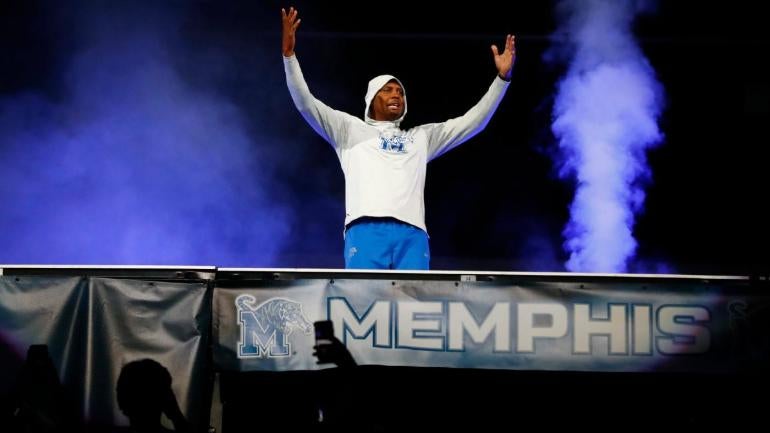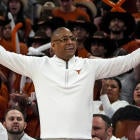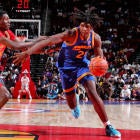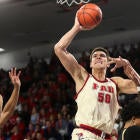
The Big 12 is expected to formally vote Friday to accept the applications of BYU, Cincinnati, Houston and UCF as the next four members of the conference, sources confirmed to CBS Sports. It's a significant save-face for the league, which will lose its two most important members -- Oklahoma and Texas -- by 2025 at the latest.
Taking into consideration the most important factors (just what are those factors? Media market, historical performance + stature in revenue sports, undergraduate enrollment + alumni base, academic profile, athletic budget, athletic facilities, history of NCAA infractions and, big as anything else, trusted connections to millionaires and/or billionaires with money to bestow) the four schools not only make sense, it's easily arguable that they're the four best options the Big 12 could have landed. The league will steady itself in football, while potentially strengthening itself in basketball.
Kudos to league commissioner Bob Bowlsby and the Big 12 presidents/chancellors for getting it done so quickly. This maneuver not only saved Bowlsby's job, it saved the power-conference structure as we know it, and in the process possibly helped in eventually making a 12-team College Football Playoff a reality.
But for all the acclaim Bowlsby, the Big 12 and its four new members will get, there is one perceived big loser in all of this: the University of Memphis. Since adding BYU (once it was content with leaving its precious independence in football), Houston and UCF were no-brainers, the Tigers essentially lost out to Cincinnati in a close race. The Bearcats are better historically in men's hoops and football. Their media market ranks No. 37 to Memphis' 51. Critically, Cincinnati is in Ohio, which is one of the five best football states.
The Big 12's pick of UC is more than understandable -- it's responsible. While at the same time being a huge blow to Memphis. (There of course remains the possibility the Big 12 isn't done with its expansion. But it's done for now. And we could well look up in a decade and see that the Big 12 -- here's a novel idea -- is still contently humming along with 12 teams.)
Kentucky, Mark Few and the new-look Big 12. All that and more are discussed on the newest ep of Eye on College Basketball.
Despite the blow to Memphis' ego, there is more than a silver lining here. There's a tempting opportunity for the school -- which should be spearheaded by its basketball ethos -- to capitalize on being left behind. Memphis, most obviously, was passed over because it is historically a bad football school. There have been recent pockets of football success, but that university is a basketball place through and through. And if it wants to maintain its relevance going forward -- regardless of its conference affiliation -- it needs to lean into its basketball infatuation and never look back.
Go and try to be the next version of Gonzaga.
Push all-in on hoops. Be what you're best at and relentlessly pursue it, even beyond the levels you were at under John Calipari. Embrace your natural habitat: a basketball-first/basketball-second/basketball-third school in a basketball-loving city that's rich with talent and all too eager to compete against the biggest teams in the sport. There are but a few schools outside the power-conference structure that can truly compete nationally and strive for top-10 status nearly every season. Memphis is one of them.
I'm not suggesting Memphis can duplicate the conference dominance and absurd consistency that Mark Few has instituted at Gonzaga and within the WCC. But the basketball program at Memphis is obviously best equipped to be the closest thing to it. (Coincidentally, Gonzaga will soon be negatively impacted as well, as BYU has proven to be an important conference opponent for the Zags in the WCC since 2011.)
With Penny Hardaway coaching the Tigers, Memphis has a window right now to become the closest thing to Gonzaga that we'll probably ever see. It's a school with the resources -- in addition to a superior talent base and someone who's already proven to be a top two-or-three recruiter -- to dominate its league going forward. The American Athletic Conference has unquestionably taken a devastating hit amid all this and will be downgraded across the board. But it's still a multi-bid league. Memphis is the undisputed best team left.
There's a lot to be said for lording over a conference. That has an appeal, and if you hit it right, it can grow into something almost automatic.
If Hardaway is as good of a coach as Memphis hopes/thinks he is (and a huge, perhaps defining test of that awaits this season), then the Tigers can overcome this bitter loss in conference realignment by turning into a perennial top-10 powerhouse in men's college basketball. That means something. Might mean something more in Memphis than all but five or six other schools in America. If Hardaway, 50, wants to guide this program for the next decade at minimum and throttle up, the upside is spectacular.
There will be some who resist this and insist on chasing football glory. I'm not saying Memphis needs to shutter its football program or go independent like UConn. But about that: there is something to be learned from UConn. The parallels are interesting. UConn was a non-factor in football forever. Hit a few really good years in the late 2000s, then chased the almighty football dollar.
It went miserably. The school pulled the rip cord a half-decade into its AAC affiliation, in no small part because the fan base was continually irate with UConn for alienating its Big East roots and basketball selfhood. There's a lot to be learned from a lot of schools who chased football opulence, were put in the blender of conference realignment, and have very little to show for it since.
Boston College. Miami. Maryland. Rutgers. Nebraska. Missouri. Texas A&M. Merely an initial list of casualties from the past two decades alone. None of those schools are more successful, or more relevant, today than they were in their prior conference. Before football and bigger-league pipe dreams led them to destroy traditions and tread new trails toward a place where, sure, the money is bigger. But at what cost to the prestige and reputation of your program, your school?
The realignment success stories of the 21st century are ... hmm ... Colorado's ... basically no different from where it was? So is Syracuse, but with worse intra-conference rivalries? Utah's done well for itself, I suppose. Louisville's in a better spot, for sure (in spite of the scandals). Point is, the list of schools the past two decades that are better off after realignment at the power-league level is much shorter than the list of schools that are just sort of blandly bobbing about and existing as middle- or below-the-pack fodder.
Resources only take you so far. Success in college sports is rooted in passion, tradition and embracing the identity of what you do best. Is there any doubt about how this applies to Memphis? It's a basketball school.
Memphis can (modestly) make up on the millions it will miss out on by shamelessly becoming one of the biggest, boastful, brazen basketball entities in college hoops. That, in turn, will turn profits. Grow into the bully of the American, or whatever league it is in. Because at this point, Memphis has got to be the most attractive athletic entity not in a Power Five conference. It's located in the middle of the country, based in a culture-rich city that also has a pro-sports franchise. Memphis has a big appeal to the South, but tentacles touching the Midwest.
Penny Freaking Hardaway is the face of the school now.
There will never be another Gonzaga in college basketball. But if there's ever going to be something just as close, Memphis can be that. At best, it can be a respectable football school here and there. But in basketball? It can be elite -- with sustainability. Ask anyone in college sports about being elite; there's no replacing that feeling or momentum. It might not pay as much as a Power Five affiliation, but in many ways it's worth even more.






















